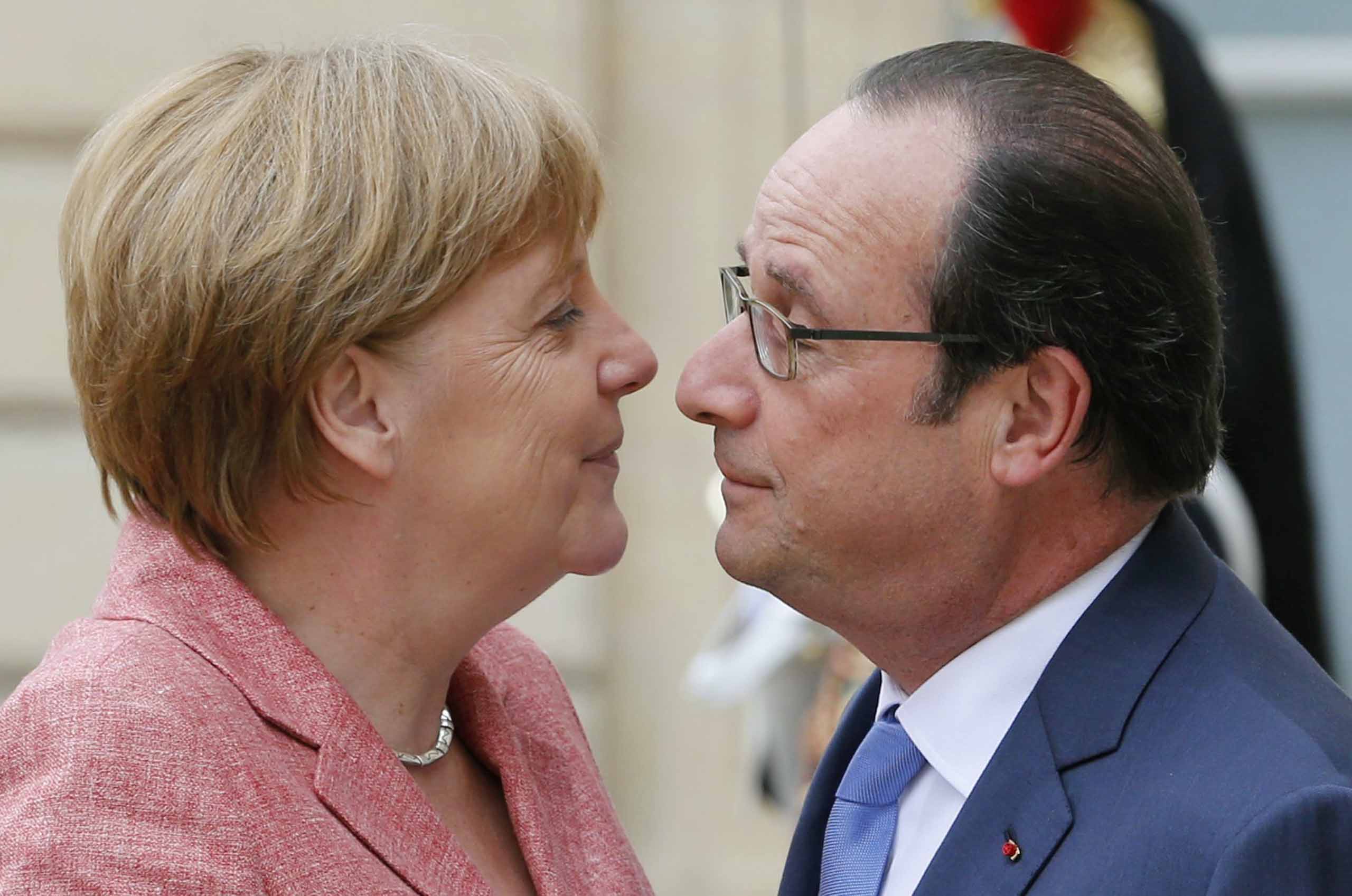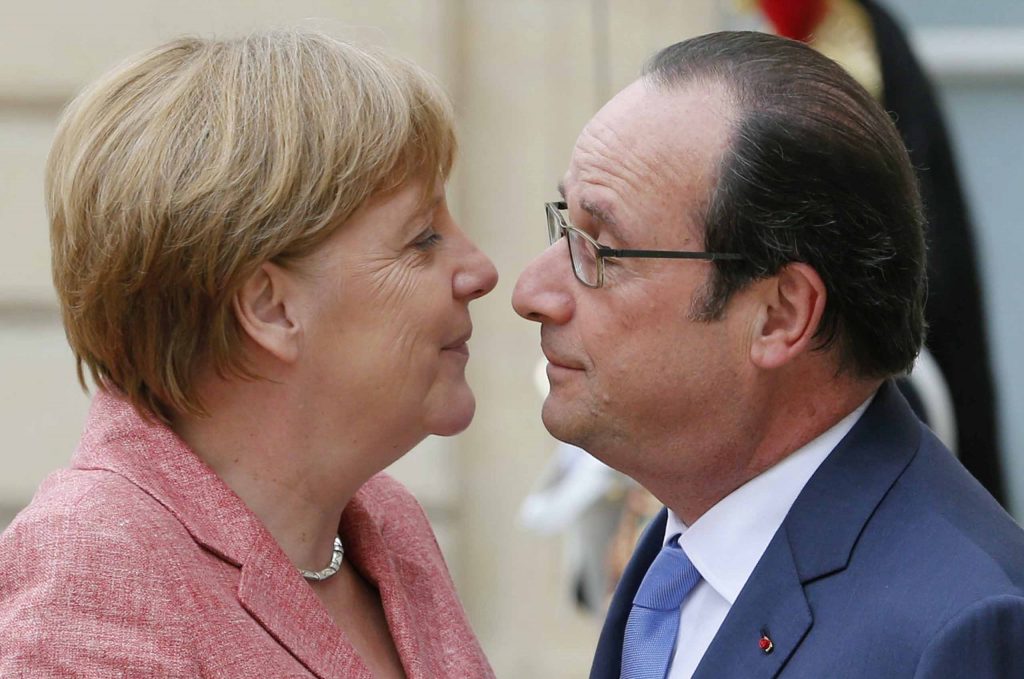
Cooperation among European law enforcement agencies is a ‘big challenge,’ says Atlantic Council’s Fran Burwell
A spate of terrorist attacks across Europe over the past nineteen months has shaken confidence in European security, but has had divergent impacts on the popularity of the leaders of France and Germany, according to the Atlantic Council’s Fran Burwell.
While German Chancellor Angela Merkel has seen a rise in support, French President François Hollande has found his already low approval ratings dip further.
“The insecurity has…led to the revival of Mutti Merkel,” said Burwell, vice president, European Union and Special Initiatives, at the Atlantic Council. The chancellor, who is viewed by the German public as a steady pair of hands that would take care of the issues in society, earned the nickname Mutti Merkel—the mother of the German family. Merkel’s warm welcome to migrants fleeing war zones in Syria, Iraq, and Afghanistan temporarily diminished this admiration as she was seen as having overstepped her bounds by being too generous. Germany registered close to one million asylum seekers in 2015.
A series of terrorist attacks—some linked to the Islamic State of Iraq and al-Sham (ISIS), the very terrorist group a majority of the migrants are fleeing—has also eroded public support for the migrants. An Ifop poll conducted in January found support among the French for migrants had dwindled. A recent Pew Research Center poll found that in eight of the ten European nations in which the survey was conducted half or more of the people surveyed believe that the influx of migrants will increase the prospects of terrorism.
On July 26, two men murdered a Catholic priest and grievously wounded one of his parishioners at the church of Saint Étienne du Rouvray near Rouen, France. Hollande blamed the attack on ISIS supporters. The attackers said they were both from ISIS. Both the assailants were shot dead by police.
Far-right political parties across Europe have, meanwhile, sought to exploit the growing anti-immigrant sentiment. This could pose a challenge for leaders like Merkel and Hollande who face re-election battles in 2017.
The attack in Rouen was the fourth in a string of major terrorist attacks in France over the past nineteen months. In January of 2015, an assault on the satirical publication Charlie Hebdo in Paris and a Jewish deli left seventeen people dead; coordinated attacks on the Bataclan concert hall, and cafes and restaurants in and around Paris on November 13, 2015, killed 130 people; and on July 14, a lone attacker rammed a cargo truck into a crowd celebrating Bastille Day in Nice killing eighty-four people. The attacks have been linked to ISIS.
ISIS has also claimed responsibility for attacks in Germany. A Syrian suicide bomber who injured fifteen people at a music festival in Ansbach on July 24 had reportedly pledged allegiance to ISIS’ leader Abu Bakr al-Baghdadi. On July 18, an immigrant, also inspired by ISIS, stabbed passengers on a train in Bavaria. And on July 22, a teenage gunman with German and Iranian dual nationality, killed nine people in Munich. In this case, however, there were no apparent links to any terror groups.
Earlier, on March 22, thirty-two people were killed in attacks on Brussels’ international airport and a metro station in Molenbeek—a Brussels suburb. ISIS claimed responsibility for those attacks.
These attacks have exposed the lack of security cooperation among European nations.
“It is about the old established way of the business of policing versus a new threat,” said Burwell. “Many European police and security systems are based on very local threats.”
“What has changed in Europe is that everyone knows that this cooperation [among European states] needs to be built. The question is how to disrupt established patterns of work and to ensure that cross-border cooperation does develop,” said Burwell. “That is going to be a long road. You don’t flip a switch and it is suddenly there. That is a big challenge for Europe.”
Fran Burwell spoke in an interview with the New Atlanticist’s Ashish Kumar Sen. Here are excerpts from our interview.
Q: ISIS-inspired attacks in France and Germany appear to have eroded the European public’s support for migrants. What impact do you expect this to have on the migrant policies of European governments?
Burwell: This spate of attacks has made Europe, in general, feel less secure. Before that, even though there were occasional attacks like the London bombing [on July 7, 2005], there wasn’t a feeling of Europe being under attack. Along with the situation in Ukraine, the verbal aggression from [Russian President Vladimir] Putin, and the experience of having huge numbers of people cross your borders, there is more of a feeling that everywhere you are in Europe is under attack and is not safe.
Europe used to be a very safe place. Now, with this strategy of going after citizens as opposed to major public buildings and government offices, there is much more a feeling of randomness. So one can’t be surprised that this is having an impact on public mood. However, I haven’t seen any real data yet in terms of public anxiety.
On the contrary, what you are seeing is that over the past week, Chancellor Merkel’s support has risen. The insecurity has led to the revival of Mutti Merkel. It is far from clear that the insecurity that people naturally feel in this circumstance will rebound to the benefit of the far-right, for example.
It is quite different in Germany where there is a respect for the police force and security services that are pretty unified. After the Nice attack, on the other hand, you had some unseemly squabbling between the local and the federal police and a report that showed how the structure of French policing was really not amenable to countering this type of attack.
Q: What challenges are acts of terrorism, in Germany and France, in particular, likely to pose for leaders who have been welcoming of migrants and are up for re-election?
Burwell: To some degree, I think in these situations it is very much a country-by-country reaction. A leader like Merkel who is seen as strong, consistent, almost like a security blanket, we are already seeing that she has seen some benefits in terms of her poll numbers. People go toward what they know. But if the leader is already distrusted, it can make things worse.
In Germany and France we are seeing two different phenomena. It is not clear to me that the people who are leaving the support of Hollande—not that he had much support—are going to [Marine] Le Pen [of the far-right National Front].
Q: Is [former French President Nicolas] Sarkozy benefiting from Hollande’s unpopularity?
Burwell: Possibly, but he has a lot of historical baggage with the French people. [Former French Prime Minister Alain] Juppé may be someone to watch. We are too early in the process. There is no one who is clearly benefitting from this so far.
Q: What challenges face European society and governments when it comes to integrating migrant communities?
Burwell: The first thing governments need to do is to get information out there about who the attackers are and why they did this. The attacker in the shopping center in Munich was German-born. He was not a migrant. He seemed to have simply been fascinated by mass shootings, including the Breivik one in Norway. It was not a terrorist incident. Getting the information out there before rumors get started has been very helpful.
In general, the German police have done very well on this. And following the attack in Nice we saw it emerge quite quickly that there was a rapid radicalization and that this person was a troubled person to start with.
The European experience is similar to what we have experienced in Orlando, for example, and in other mass shootings in the United States where you have someone who is clearly troubled and takes on at least a veneer of radicalization, but maybe that was not the original cause and just happened to be a handy ideology.
One question is what do we do about the displaced in our society and those challenged by mental illness? That applies to both the United States and Europe. One interesting result of the Munich shooting was greater discussion in Germany about gun laws.
In terms of migrants, clearly this will affect the public view of migrants. Those who saw them as victims and wanted to help them unequivocally must now deal with the fact that some of these individuals are disturbed or subject to the influences of radicalization. There is no easy way to deal with the integration of such a large number of people from a different culture, from different experiences, and some of them perhaps with huge amounts of trauma in their recent pasts, into societies that have, until very recently, have been very mono-ethnic. It is all part of this change that is happening very, very fast in Europe. It is going to be tough. I don’t think anyone should be under any illusion about that.
Q: In the face of a common security threat, what steps should European governments be taking to better coordinate their security efforts?
Burwell: It is about the old established way of the business of policing versus a new threat. Many European police and security systems are based on very local threats. If you can imagine the United States after 9/11 trying to address some of the issues about terrorism in this country without an FBI—that is basically what we are talking about here—if you can imagine the Maryland state police and the Virginia state police trying to cooperate, we have seen how difficult this can be. Europe doesn’t have an FBI. It doesn’t have a police force that goes across borders. Right now, the priority is justifiably on building better coordination between local and municipal police forces and national police forces.
You clearly have instances, for example in Brussels and Paris, where the perpetrators of those attacks were crossing borders with impunity. The question then becomes how do you get two national police forces to cooperate and share information? What has changed in Europe is that everyone knows that this cooperation needs to be built. The question is how to disrupt established patterns of work and ensure that cross-border cooperation does develop. That is going to be a long road. You don’t flip a switch and it is suddenly there. That is a big challenge for Europe.
Ashish Kumar Sen is deputy director of communications at the Atlantic Council. You can follow him on Twitter @AshishSen.
Image: French President François Hollande welcomed German Chancellor Angela Merkel as she arrived to attend a Western Balkans summit at the Élysée Palace in Paris, France, on July 4. (Reuters/Regis Duvignau)
